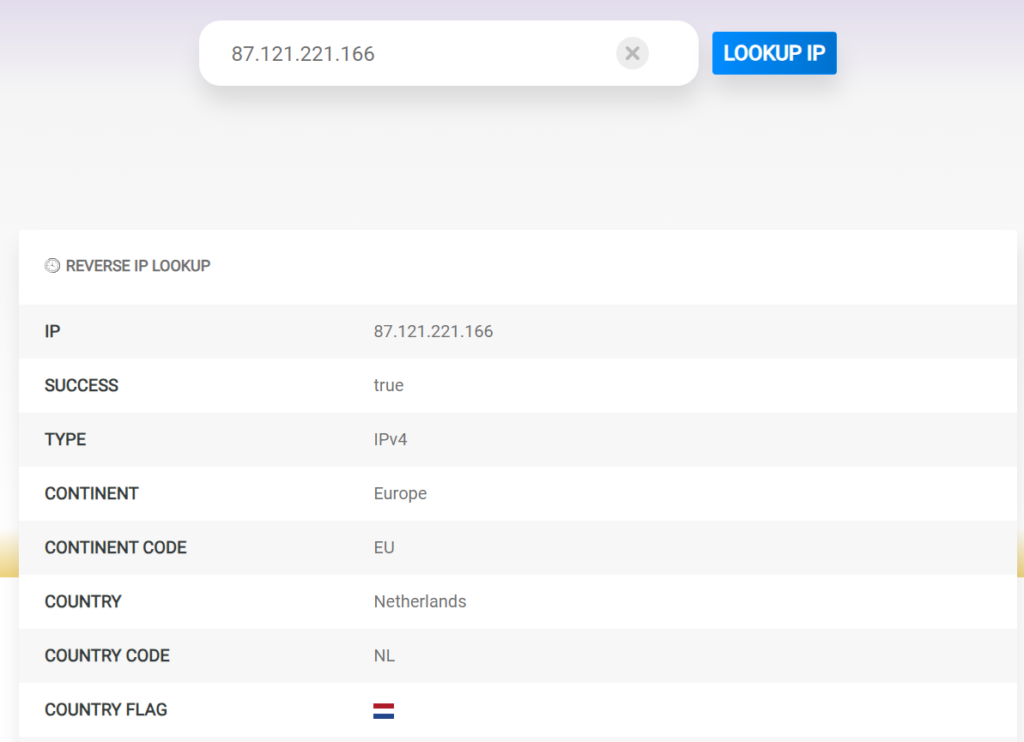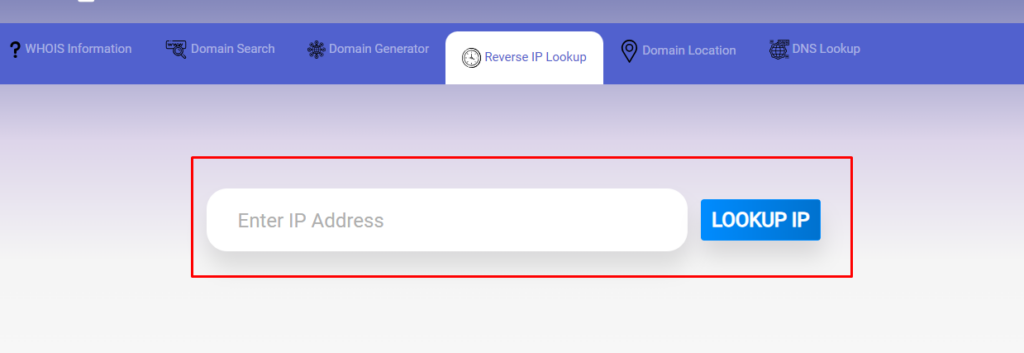In today’s interconnected world, digital footprints play a significant role in our online presence.
Every action we take, every website we visit, and every interaction we have online leaves a trace, forming a unique digital footprint.
These footprints hold valuable information that can be leveraged for various purposes, including cybersecurity, investigations, and targeted marketing.
One powerful tool that helps decode these footprints is reverse IP address lookup.
An Overview of Reverse IP Address Lookup
Reverse IP address lookup is a technique used to uncover information about websites and online activities by analyzing their associated IP addresses.
By querying a given IP address, this process reveals the domains hosted on that IP and provides insights into the entities behind them.
This article delves into the world of reverse IP address lookup, exploring its definition, functionality, applications, tools, benefits, limitations, and future trends.
What is Reverse IP Address Lookup?

Reverse IP address lookup, also known as reverse DNS lookup, is a method that allows you to determine the domains associated with a specific IP address.
Instead of looking up a domain name to obtain its IP address, this process works in reverse. By inputting an IP address into a reverse IP lookup tool or service, you can unveil the domains hosted on that IP.
How Reverse IP Address Lookup Works
Reverse IP address lookup works by querying a DNS (Domain Name System) server for the PTR (Pointer) record associated with a given IP address.
The PTR record contains the domain name mapped to that IP address.
The reverse IP lookup tool performs this query and retrieves the relevant information, providing valuable insights into the web presence associated with the IP.
The Difference Between Forward and Reverse IP Lookup
While forward IP address lookup involves translating a domain name into its corresponding IP address, reverse IP address lookup reverses the process. It allows you to determine the domain names hosted on a specific IP address.
Both forward and reverse IP lookup are essential for understanding the connections between domain names and IP addresses.
Applications of Reverse IP Address Lookup
1. Enhancing Cybersecurity: Identifying Potential Threats
Reverse IP address lookup plays a crucial role in cybersecurity. By examining the domains hosted on a suspicious IP address, security professionals can identify potential threats, such as malicious websites, phishing campaigns, or botnets. This information enables proactive measures to protect systems, networks, and sensitive data from cyberattacks.
2. Website Investigation: Uncovering Suspicious Activities
Reverse IP address lookup is a valuable tool for investigating websites and uncovering suspicious activities. Law enforcement agencies, cybersecurity firms, and digital forensics experts utilize reverse IP lookup to identify interconnected websites involved in illegal or unethical activities. It helps reveal hidden networks, uncover links between websites, and gather evidence for further investigation.
3. Online Brand Protection: Monitoring Online Presence
For businesses, reverse IP address lookup assists in online brand protection. By regularly monitoring the domains associated with their IP addresses, companies can identify unauthorized use of their brand, trademark infringements, or instances of brand dilution. This proactive approach allows businesses to take appropriate action to safeguard their reputation and intellectual property.
4. Law Enforcement and Digital Forensics: Tracing Criminal Activities
In the realm of law enforcement and digital forensics, reverse IP address lookup aids in tracing criminal activities. By mapping IP addresses to the associated domains, investigators can identify websites involved in illegal operations, track online fraud, and gather evidence to support legal proceedings. It helps uncover the digital trails left behind by cybercriminals.
5. Geolocation Targeting: Tailoring Content and Advertising
Reverse IP address lookup has a marketing application as well. By geolocating IP addresses, businesses can tailor their content and advertising to specific regions or target audiences.
This technique enables personalized marketing campaigns, localized content delivery, and improved user experiences based on the geographical locations of website visitors.
Tools and Techniques for Reverse IP Address Lookup
1. Online Reverse IP Address Lookup Tools
Several online tools and services offer reverse IP address lookup capabilities.
These user-friendly platforms allow individuals and businesses to input an IP address and obtain comprehensive information about the associated domains.
Some popular tools include IP lookup websites, dedicated reverse IP address lookup services, and cybersecurity platforms offering IP intelligence features.
2. Command-Line and Scripting Methods
For advanced users, command-line tools and scripting methods provide flexibility and automation in reverse IP address lookup.
These techniques involve using command-line interfaces or scripting languages to query DNS servers and retrieve PTR records.
Read also: How To Perform A Reverse IP Address Lookup Command
3. Using WHOIS Databases for IP Lookup
WHOIS databases are valuable resources for reverse IP address lookup.
These databases contain registration information about domain names, including the IP addresses associated with them.
Querying WHOIS databases can obtain details about the domains hosted on a specific IP address, including ownership information, registration dates, and contact details.
A good example of such tools is WHOIS.is reverse IP lookup.
To use it, head over to https://whois.is/ip-lookup and paste the IP onto the provided box.

4. APIs and Integrations for Automated Reverse IP Lookup
APIs (Application Programming Interfaces) and integrations offer automated reverse IP address lookup capabilities.
These interfaces allow developers to integrate reverse IP lookup functionality into their own applications, websites, or security systems.
Benefits and Limitations of Reverse IP Address Lookup
Advantages of Reverse IP Address Lookup in Investigations
Reverse IP address lookup provides several advantages in investigations. It helps investigators establish connections between websites, identify potential suspects, and uncover hidden networks. By mapping IP addresses to domains, investigators can gather valuable intelligence, support digital forensics efforts, and build stronger cases against cybercriminals.
Privacy Concerns and Ethical Considerations
While reverse IP address lookup offers valuable insights, it raises privacy concerns and ethical considerations. The technique involves accessing and analyzing information associated with IP addresses, which may include personal or sensitive data. It is crucial to handle this information responsibly, adhering to legal frameworks and privacy regulations to ensure the protection of individuals’ privacy rights.
Challenges and Limitations in Obtaining Accurate Data
Obtaining accurate data through reverse IP address lookup can present challenges. In some cases, the information retrieved may be outdated, incomplete, or obscured due to privacy measures. The dynamic nature of IP address assignments and the use of content delivery networks (CDNs) can also complicate the accuracy of reverse IP lookup results. Users must be aware of these limitations and interpret the data accordingly.
Case Studies: Real-Life Examples
Notable Cases Solved with Reverse IP Address Lookup
As already mentioned, reverse IP address lookup is a powerful tool that can be used to track down the source of malicious activity.
And by tracing an IP address back to its registered owner, investigators can identify the person or organization responsible for a crime.
Here are some notable cases that have been solved with reverse IP address lookup:
- The 2008 Mumbai attacks: In 2008, a series of coordinated terrorist attacks killed 166 people in Mumbai, India. The attackers used the internet to communicate with each other, and their IP addresses were eventually traced back to a group of Pakistani nationals.
- The 2013 Sony Pictures hack: In 2013, hackers broke into the computer systems of Sony Pictures Entertainment and stole a trove of sensitive data. The hackers’ IP addresses were traced back to North Korea, and the United States government accused the country of being responsible for the attack.
- The 2017 WannaCry ransomware attack: In 2017, a ransomware attack crippled computer systems around the world. The attack was carried out using a piece of malware that was spread through a vulnerability in Windows operating systems. The IP addresses of the computers that were infected with the malware were traced back to a group of hackers in Eastern Europe.
These are just a few examples of the many cases that have been solved with reverse IP address lookup. This tool is a valuable asset for law enforcement and security professionals, and it can be used to track down criminals and bring them to justice.
In addition to these high-profile cases, reverse IP address lookup is also used by businesses and individuals to protect themselves from online threats. By tracing the IP addresses of malicious emails or websites, users can identify the source of the threat and take steps to protect themselves.
Best Practices for Using Reverse IP Address Lookup
Legal and Ethical Guidelines
When utilizing reverse IP address lookup, it is essential to follow legal and ethical guidelines.
Familiarize yourself with the applicable laws, regulations, and privacy policies governing the use of such tools and techniques. Obtain necessary permissions when conducting investigations, and respect individuals’ privacy rights by handling the obtained information responsibly and securely.
Ensuring Data Privacy and Compliance
To ensure data privacy and compliance, implement robust security measures when performing reverse IP address lookup. Safeguard the obtained data from unauthorized access, use secure channels for data transmission, and adhere to industry standards and best practices for data protection. Regularly review and update privacy policies to align with evolving regulations and maintain compliance.
Maximizing the Effectiveness of Reverse IP Address Lookup
To maximize the effectiveness of reverse IP address lookup, consider integrating it into a comprehensive cybersecurity strategy. Combine reverse IP lookup with other security measures, such as threat intelligence platforms, intrusion detection systems, and security information and event management (SIEM) solutions. Regularly update and validate the obtained data to ensure its accuracy and relevance.
Tips for Choosing a Reliable Reverse IP Address Lookup Service
When choosing a reverse IP lookup tool or service, consider key features that enhance its reliability and usability.
Look for tools that provide accurate and up-to-date information, offer intuitive user interfaces, and deliver comprehensive reports.
Additional features like geolocation data, historical IP data, and API access can further enhance the effectiveness of the reverse IP address lookup service.
When selecting a reverse IP address lookup service provider, consider several factors. Evaluate their reputation, customer reviews, and track record in delivering reliable results.
Assess the provider’s data sources, coverage, and data freshness to ensure the accuracy and comprehensiveness of the obtained information. Consider the scalability, pricing models, and support options offered by the provider to meet your specific needs.
Future Trends and Developments
Reverse IP address lookup technology is constantly evolving to meet emerging challenges and demands.
Advancements include improved data accuracy, integration with artificial intelligence and machine learning algorithms for enhanced analysis, and the development of innovative tools and techniques.
Continued research and development efforts are driving the evolution of reverse IP address lookup, making it an increasingly valuable tool for various industries.
The future of reverse IP address lookup holds significant implications for cybersecurity and digital investigations. As cyber threats continue to evolve, reverse IP lookup will remain an essential tool in identifying and mitigating risks. Advancements in data analysis, automation, and threat intelligence integration will further empower organizations in detecting and responding to cyber incidents effectively.
Conclusion
Reverse IP address lookup serves as a powerful tool for unraveling the mysteries hidden within digital footprints.
From enhancing cybersecurity to aiding investigations, this technique offers valuable insights into the domains associated with specific IP addresses.
By harnessing the power of reverse IP address lookup, individuals, businesses, and law enforcement agencies can proactively protect themselves, uncover illicit activities, and make informed decisions.
In the digital age, understanding and decoding digital footprints is of utmost importance.
Reverse IP address lookup provides a window into the interconnected web of online activities and serves as a valuable resource for various purposes.
By recognizing the significance of digital footprints and leveraging reverse IP address lookup effectively, individuals and organizations can navigate the digital landscape with confidence and uncover hidden insights that drive success.
